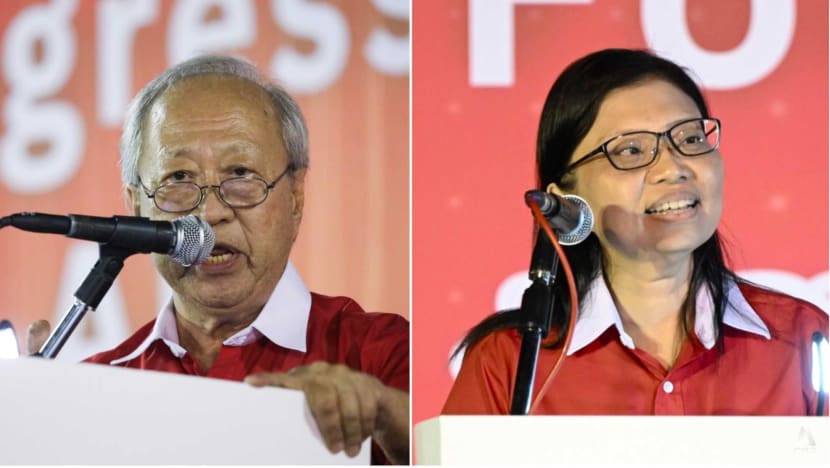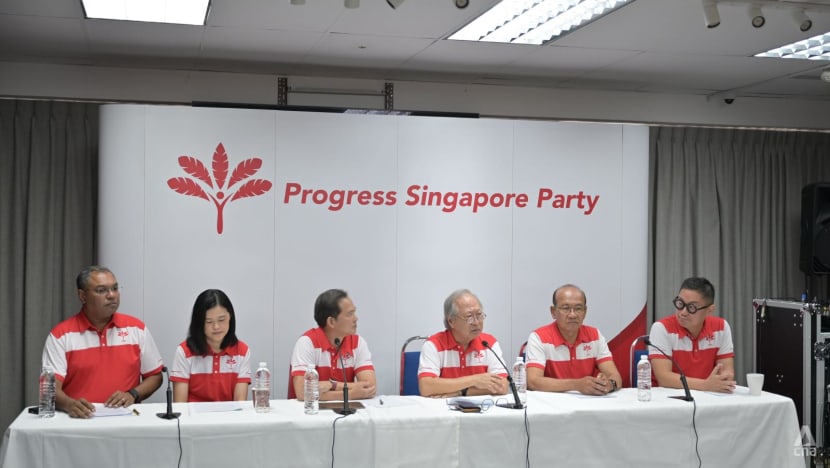Tan Cheng Bock and Hazel Poa step down from PSP’s top decision-making body
Both Dr Tan and Ms Poa remain members of the party.

Progress Singapore Party's Tan Cheng Bock and Hazel Poa speaking at a PSP rally during the 2025 General Election. (Photos: CNA/Mak Jia Kee, Marcus Mark Ramos)

This audio is generated by an AI tool.
SINGAPORE: Progress Singapore Party (PSP) founder Tan Cheng Bock and former secretary-general Hazel Poa have stepped down from the party's central executive committee (CEC), its top decision-making body.
The party announced the leadership changes on Saturday (Jul 5), stating that Dr Tan will be succeeded as party chairman by Mr A’bas Kasmani.
Despite stepping down from the committee, both Dr Tan and Ms Poa remain members of the party. The two were part of PSP’s slate in West Coast GRC during the 2025 General Election.
Treasurer S Nallakaruppan has also stepped down from his role, though he too continues as a member of the party.
As part of its leadership renewal, PSP has co-opted three new members into the CEC: Mr Sani Ismail, Mr Lawrence Pek and Ms Stephanie Tan. Mr Leong Mun Wai will remain as secretary-general.
At a press conference on Saturday, Mr Leong addressed the party's recent electoral performance and outlined PSP's next steps.
"The last election is a loud wake-up call for PSP. But we have heard you, Singaporeans, and we will continue to listen to you and strive to serve you better," he said.
"While we have lost, we are not giving up. To be the party that you can trust, PSP must get back up on our feet from where we have fallen."
When asked why he chose to step down from the party's top governing body, Dr Tan said it was important to allow the new team to lead.
"I'm always around and I think with my presence in the CEC, I fear they might not be able to express themselves more," he said.
"So to be fair to them, I think I better stand aside, still responding to whatever advice they want from me."
Dr Tan and Mr Leong also addressed questions regarding Ms Poa's decision to step down, as well as the absence of both her and Mr Nallakaruppan from the press conference.
Ms Poa is "not so well" and has poor vision, but still had the courage to come forward to serve in the party, said Dr Tan.
"Now she felt that we have done quite enough for the party and we want to leave it to the newer guys," he said, adding that they had discussed the matter and mutually agreed it was time to step away from the CEC.
"We will miss her tremendously. We respect her decision to step down and wish her all the best," said Mr Leong. He also said the press conference was "focused on the future of the party".
PSP had elected its previous CEC in March, two months before the General Election. When asked about why the changes are being rolled out only a few months later, Dr Tan said the party was reacting to public feedback.
While the party was "always on the lookout for succession", its plan before the election was to focus on it, said Mr Leong.
"If we managed to gain seats, then a lot of the focus of the party would be on how to fulfill our responsibilities as MPs. But now we have not gotten any seats in parliament, so our party focus now is how to accelerate the plan, because then we can devote all our energy into renewing the party," he added.
The renewal is "not a drastic change", said the secretary-general. "I think we have also heard from voters in this election that we need to polish our party even further."
One thing they needed to do was bring in younger leaders into the party's top decision-making body, said Mr Leong.
"Dr Tan has always been very proactive in trying to find successors ... but because the party was too preoccupied with actually trying to win the election, as a result, we may not have done enough in terms of bringing younger leaders to the forefront as fast as we want," he added, noting that the party also received this feedback from the public.
After the election, the party saw a surge in the number of new younger members, said Mr Leong. "We are very grateful that PSP continues to attract talent to our party."

Political analysts said the departure of Dr Tan is significant, and that the party knows it must go beyond being the veteran politician's alter ego.
The message PSP is sending is that "we hear you", said Associate Professor of Law at Singapore Management University (SMU) Eugene Tan.
"The party is making a rather decisive move to change course, recognising that the old blood leadership must make way for new blood," he said.
Associate Professor Chong Ja Ian of the National University of Singapore's (NUS) department of political science said: "Showing that the PSP is more than a Tan Cheng Bock party is important."
It indicates where the PSP is developing ideologically, he added.
NUS Assistant Professor of political science Elvin Ong said that whether the PSP can successfully reinvent itself depends not just on personnel, but also the "strategic articulation" of their beliefs.
"What PSP stands for ideologically by itself, and relative to the (People's Action Party) and other opposition parties, is still unclear."
At the press conference, Mr Leong said PSP wants to strengthen its fundamentals before announcing big plans going forward.
"What we look forward to the most is that people realise that PSP has changed even without announcing it. We'll prove that to you in the next few years," said the party's chief.
Losing the two NCMP seats in parliament is a "big loss", he added.
"But that's not all, and not all is lost ... As long as we have a heart to serve, I think we can continue to come up with ways to access Singaporeans."
For now, PSP will concentrate on working the ground in constituencies that it has contested before, and will not be looking at new areas, said Mr Leong.
LEADERSHIP CHANGES FOLLOW ELECTORAL SETBACK
The leadership reshuffle comes in the wake of PSP’s disappointing showing in the 2025 General Election, where it lost in all six constituencies it contested. The results marked the end of the party's five-year presence in parliament through Non-Constituency MP (NCMP) seats held by Mr Leong and Ms Poa after their near-win in West Coast GRC in 2020.
In this year's election, PSP's flagship team in West Coast-Jurong West GRC – comprising Dr Tan, Mr Leong, Ms Poa and newcomers Sumarleki Amjah and Mr Ismail – received 39.99 per cent of the vote, losing to a People's Action Party team led by Minister for Education Desmond Lee.
In contrast, the PSP team contesting West Coast GRC in 2020 – including Dr Tan, Ms Poa, Mr Leong, Mr Nadarajah Loganathan and Mr Jeffrey Khoo – achieved 48.32 per cent of the vote. That result secured NCMP seats for Ms Poa and Mr Leong and significantly boosted the party’s national profile.
PSP knows that the "path to reform" will be long and challenging, but will continue to work hard, said Mr Leong on Saturday.
He outlined a renewal plan centred on four key areas: nurturing new leaders mentored by founding leaders of the party, building stronger trust with Singaporeans on the ground, helping Singaporeans to understand the government's policies better and making PSP's voice online louder.
"We're confident that we're able to realise and build a stronger PSP for the next General Election," he said.
SMU's Assoc Prof Tan said PSP is the first party to respond to their "relatively poor performance" in this year's General Election, and that is a positive sign.
The party realises that change is inevitable and they are trying to respond as best as they can, he said.
"PSP has gone from being the star performer in GE2020 to almost being a marginal player in GE2025," he added.
"Their political star has fallen significantly in a matter of five years. So a course correction is necessary."
The party chief is in prime position to rebrand PSP, but whether he can do so is another matter.
"The question is: Is Leong Mun Wai part of the solution or (does he remain) part of the problem?" said Assoc Prof Tan.
Assoc Prof Chong of NUS said it remains to be seen whether the leadership reshuffle will boost the PSP's electoral chances in the future.
PSP has been seen as a more grassroots party that highlighted serving voters on the ground, but that may not be enough in Singapore's current political climate, he said.
"The last election demonstrated that Singaporeans want political parties that have a clearer idea of who they are and what they offer voters not just locally, but nationally as well," he said.
That was part of the reason why the PAP and Workers' Party did well, he added. "The PSP will need to ... craft its own direction."


















